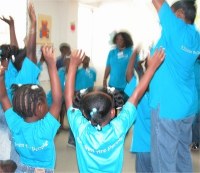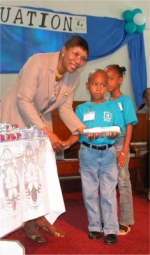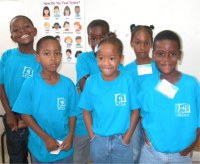
|
|
Drug Abuse is one of the most consistent and significant contributors
to the social problems in existence in our communities today. Thus,
the primary objective of this proposed programme is the facilitation
of ‘drug abuse prevention’.
 |
The Children
Are People ( CAP) Support
Group is one that offers children within the five to twelve
(5-12) age range the opportunity to learn skills in the area
of coping with peer pressure and conflict.
< Read more
about CAP > |
Permission requested to use information from www.guideline.gov
Impact of Substance Abuse on Families
People who abuse substances are likely to find themselves increasingly
isolated from their families. A growing body of literature suggests
that substance abuse has distinct effects on different family structures.
The effects of substance abuse frequently extend beyond the nuclear
family. Extended family members may experience feelings of abandonment,
anxiety, fear, anger, concern, embarrassment, or guilt, or they
may wish to ignore or cut ties with the person abusing substances.
Various treatment issues are likely to arise in different family
structures that include a person who is abusing substances:
- Client who lives alone or with a partner. In
this situation, both partners need help. The treatment of either
partner will affect both. When one person is chemically dependent
and the other is not, issues of codependence arise.
- Client who lives with a spouse (or partner) and
minor children. Most available data on the enduring effects of
parental substance abuse on children suggest that a parent’s
drinking problem often has a detrimental effect on children. The
spouse of a person abusing substances is likely to protect the
children and assume the parenting duties not fulfilled by the
parent abusing substances. If both parents abuse alcohol or illicit
drugs, the effect on children worsens.
- Client who is part of a blended family. Stepfamilies
present special challenges under normal circumstances; substance
abuse can intensify problems and become an impediment to a stepfamily’s
integration and stability. Clinicians should be aware of the dynamics
of blended families and that they require additional considerations.
- An older client who has grown children. An older
adult with a substance abuse problem can affect everyone in a
household. Additional family resources may need to be mobilized
to treat the older adult’s substance use disorder. As with
child abuse and neglect, elder maltreatment can be subject to
statutory reporting requirements for local authorities.
- Client is an adolescent and lives with family
of origin. When an adolescent uses alcohol or drugs, siblings
in the family may find their needs and concerns are ignored or
minimized while their parents react to continuous crises involving
the adolescent who abuses alcohol or drugs. In many families that
include adolescents who abuse substances, at least one parent
also abuses substances. This unfortunate modeling can set in motion
a combination of physical and emotional problems that can be very
dangerous.
- Someone not identified as the client is abusing
substances. When someone in the family other than the person with
presenting symptoms is involved with alcohol or illicit drugs,
issues of blame, responsibility, and causation will arise. With
the practitioner’s help, the family should refrain from
blaming, but still be encouraged to reveal and repair family interactions
that create the conditions for continued substance abuse.
In any form of family therapy for substance abuse
treatment, consideration should be given to the range of social
problems connected to substance abuse. Problems such as criminal
activity, joblessness, domestic violence, and child abuse or neglect
also may be present in families experiencing substance abuse. To
address these issues, treatment providers need to collaborate with
professionals in other fields (i.e., concurrent treatment). Whenever
concurrent treatment takes place, communication among clinicians
is vital. |
|





